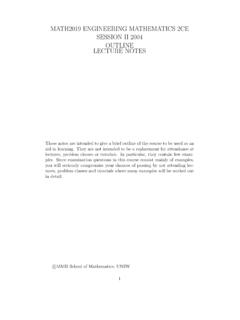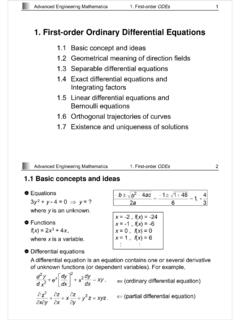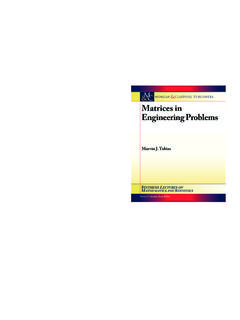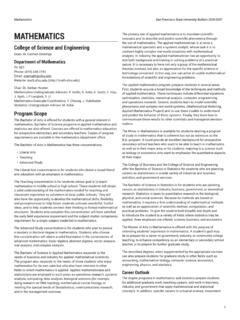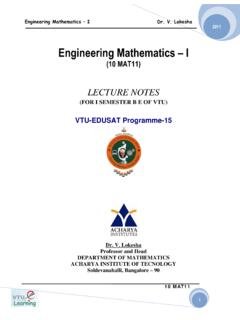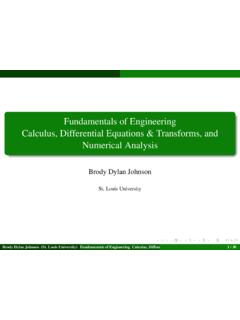Transcription of DEPARTMENT OF MATHEMATICS AND COMPUTING - lander.edu
1 DEPARTMENT OF MATHEMATICS AND COMPUTING The DEPARTMENT of MATHEMATICS and COMPUTING provides students with opportunities to earn Bachelor of Science degrees in computer information systems or in MATHEMATICS . Honors programs and minors are also offered in both disciplines. A degree in engineering is available through Lander University s dual-degree program with Clemson University. Students who complete this five-year dual-degree program receive a bachelor s degree in engineering from Clemson University and a bachelor s degree in either computer information systems or MATHEMATICS from Lander University. The DEPARTMENT s webpage ( ) contains information about the individual programs of study, scholarships available for students majoring in computer information systems or MATHEMATICS , a link to an on-line application for these scholarships, and links to the home pages of faculty members. COMPUTER INFORMATION SYSTEMS MAJOR Computer information systems are prominent in the modern world.
2 The Computer Information Systems (CIS) major allows students to develop the knowledge and skills required to understand these systems and participate in their creation and maintenance. The computer information systems major at Lander has three components: core courses, an emphasis within CIS, and a minor outside CIS. The core requirements form the basis of the program by providing the fundamentals necessary for advanced study. The emphasis allows a student to develop a specialization within computer information systems. The minor provides a domain where CIS can be put into practice. The curriculum and courses are designed and updated to accomplish the following program goals. All students graduating with a Bachelor of Science degree in Computer Information Systems will demonstrate: the skills needed to solve CIS problems; effective oral and written communications skills; the ability to independently research and complete a CIS project; and an understanding of the legal and ethical issues they may encounter as CIS professionals.
3 The CIS core includes courses in problem solving and programming skills (CIS 130, CIS 230, CIS 231, CIS 234), productivity tools, (CIS 102), information management (CIS 120, CIS 320), data communications (CIS 240), computer organization (CIS 335), analysis and design (CIS 321), and database design (CIS 360). It also includes the senior level capstone experience (CIS 499). Students can choose an emphasis in software development, in networking, or in computer engineering . The software development emphasis requires advanced courses in emerging environments and software development. The networking emphasis covers data communications and computer networking in depth. The computer engineering emphasis is part of Lander s dual-degree program with Clemson University. Students in the computer information systems/computer engineering dual-degree program must complete specific MATHEMATICS and science courses at Lander in order to meet the program requirements of Clemson University.
4 Students completing this program will be awarded both a BS in computer information systems from Lander University with a minor in MATHEMATICS , and a BS in computer engineering from Clemson University. 241 The computer information systems major requires that each student complete a minor. This minor provides competency in a secondary area where CIS can be applied. Students may choose from a number of minors, as indicated in the table below. Other minors (or a second major) offered across campus are eligible for consideration as well. The MATHEMATICS minor is suggested for students interested in pursuing graduate studies and is required for students in the computer engineering emphasis. Minor Software Development Networking Dual Degree MATHEMATICS Business Health Care Management Sociology Electronic Art Music Public Administration Cybersecurity In order to complete a computer information systems degree program in a timely fashion, students should complete the problem solving and programming skills sequence (CIS 130, CIS 230, CIS 231), along with CIS 102 and CIS 120, by the end of their third or fourth semester.
5 A grade of C or better is required in all computer information systems courses applied to the major, with the following exception: a grade of D will be allowed in at most one CIS course at the 300- or 400-level. Courses in oral and/or written communication skills (SPCH 101 and ENGL 275) are strongly encouraged. All students pursuing a degree in computer information systems are required to participate in program assessment activities and an exit interview with the computer information systems faculty during their final year at Lander University. The program requirements for the CIS major and the dual-degree program are articulated on the individual program worksheets. A successful graduate in the computer information systems major will have competency in the following areas: Information System Principles. This includes systems theory and concepts, information systems in organizations, decision support systems, and evaluation of systems performance.
6 Programming Principles. This includes problem solving, algorithm development, and application programming using structured and object-oriented approaches that stress abstraction, programming style, two or more high-level languages, and various software development environments. Data Organization and Management. This includes data and file structures, access methods, algorithm design and analysis, and relational database organization and design. Computer Organization. This includes logical organization of computers, levels of abstraction, machine and assembly languages, data representation and addressing, and memory management. Data Communications and Networking. This includes networking and telecommunications concepts and standards, distributed COMPUTING , networked information technologies, protocols, and e-commerce. System Development Methodology. This includes requirements specifications, analysis, design, implementation, and testing.
7 Also software tools, system prototyping, robustness of systems, documentation, efficiency, ethics, human-computer interaction, and software development in a team environment. Information Systems Applications. Each student will have demonstrated competency in an approved application area through completion of a minor or second major in that area. 242 The following courses will be offered as indicated. (NOTE: PHYS 203 is offered in the DEPARTMENT of Physical Sciences.) Every Fall Every Spring CIS 102 CIS 120 CIS 130 CIS 130 CIS 230 CIS 140 CIS 231 CIS 230 CIS 243 CIS 234 CIS 344 CIS 240 CIS 260 CIS 343 CIS 499 MATH 125 Even Year Fall Odd Year Spring CIS 250 CIS 360 CIS 300 CIS 440 CIS 321 PHYS 203 CIS 340 MATH 200 Odd Year Fall Even Year Spring CIS 202 CIS 320 CIS 335 CIS 330 CIS 341 CIS 498 Computer Information Systems Honors Program Students majoring in computer information systems may earn a BS Degree with Honors in computer information systems.
8 To qualify, a student must: 1. Complete the following courses: MATH 141, MATH 142, MATH 325, CIS 330, CIS 498, and any two of CIS 340, CIS 341, or CIS 440. 2. Complete six semester hours of a foreign language. This foreign language may not be English or the student s native language. 3. Submit a research proposal by January 15 of the junior year. The proposal must be approved by a majority of the computer information systems faculty and result in a finished product of sufficient quality to: (a) Receive three semester hours credit (CIS 390), and (b) Be accepted for publication or presented at a meeting of a COMPUTING society such as the Association for COMPUTING Machinery; or be presented as a seminar to faculty, students, and guests. 4. Graduate with a BS degree in computer information systems with a grade point average of in both overall coursework and in computer information systems coursework. engineering DUAL-DEGREE PROGRAM Students who wish to combine study in MATHEMATICS or computer information systems with a liberal arts program with further study in an engineering discipline may do so under the Lander University-Clemson University engineering Dual-Degree Program.
9 A student who completes this program of study will benefit from the experience of dividing their academic career between the liberal arts environment of a small university campus and the engineering climate of a large, technically-oriented university. This unique combination of study on two differently oriented campuses provides students with excellent engineering training strongly complemented by study in the humanities and social sciences. This program can be applied to the following engineering disciplines at Clemson: biosystems and materials, ceramic, civil, computer, electrical, industrial, and mechanical. Computer engineering at Clemson may be combined 243 with either a MATHEMATICS or a computer information systems major at Lander. The other engineering disciplines are coupled with a MATHEMATICS major at Lander. Students apply for admission to Clemson during their third academic year at Lander University. Acceptance into the Clemson engineering program is at the discretion of that university.
10 Clemson recommends that prospective students enroll in a summer school session at Clemson following their sophomore or junior year at Lander. A grade of C or better is required in all courses applied to the dual-degree program and in all courses which must transfer to Clemson University. Dual-degree engineering majors enter Clemson University at a level competitive with students already at that university. Successful completion of the program will result in the student being awarded a Bachelor of Science degree in engineering from Clemson University and a Bachelor of Science degree in their major from Lander University. Students will have competency in the following areas prior to leaving for Clemson University: A. COMPUTER INFORMATION SYSTEMS/ engineering DUAL DEGREE Information System Principles. This includes systems theory and concepts, information systems in organizations, decision support systems, and evaluation of systems performance.
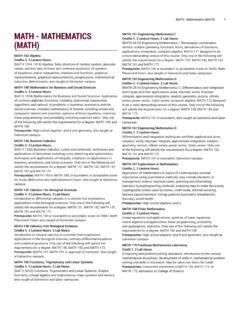
![[Engineering Mathematics]](/cache/preview/1/e/f/3/d/f/5/2/thumb-1ef3df52d76a8c1d51851076ed688d22.jpg)
